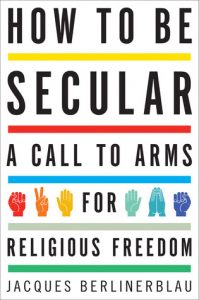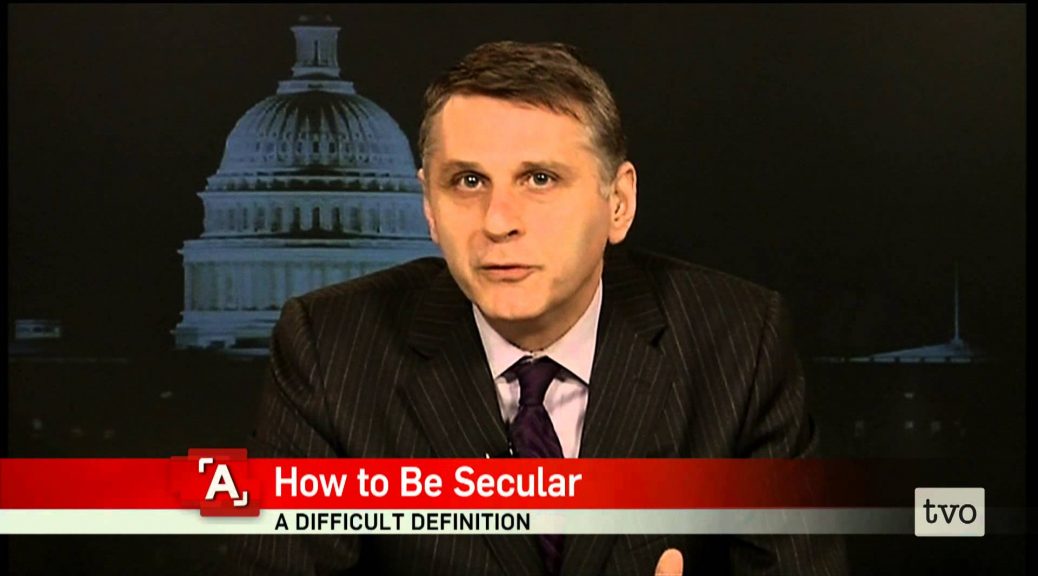
Jacques Berlinerblau – “How to be Secular – A Call to Arms for Religious Freedom”
This is a book telling secularists where they’ve gone wrong. I’m not sure I’m altogether taken with Jacques Berlinerblau’s arguments however drenched they are in academic research but he doesn’t deserve to be ignored. His persistence that New Atheists (whoever they are) are somehow to blame for secularism’s failures had me questioning a lot of what Berlinerbrau said. He spends a lot of time referencing characters and events from history with George Holyoake sufficiently dusty and in tune with his brand of secularism to get plenty of airtime in this book.
Atheists get a good beating, that’s for sure. Mr Berlinerbrau even takes a note out of the Christian extremist’s textbook of standard put-downs to turn on “secularism’s death star”, Soviet Russia and bring up that old chestnut about atheism under Stalin. “Secularism can’t get out from under one endlessly repeated slander: namely, that it was the official ideology of modernity’s most tyrannical regimes. The former Pennsylvania senator Rick Santorum has struck this with gusto, if not grammar: ‘I want to remind people of the societies that have been secular in nature. Starting with the French Revolution, moving on to the fascists, and the Nazis and the communists and the Baathists, all of those purely secularists hated religion, tried to crush religion’.” Well, yes, secularists can easily get out from under the slander since it’s mostly a crock of shite. Anyone stooping that low to dish the dirt on atheism is wilfully forgetting that life in an Orthodox seminary probably taught Stalin all he needed to know about power and control. Nazi Germany, communists and Baathists have as much to do with atheism as ISIS with Muslims packing food parcels at Glasgow’s Central mosque; or the Christian militia in the Central African Republic with King’s College Christmas Choir in Cambridge. Stalin might’ve been doing a service to atheism setting up an Atheist museum or educating women in Afghanistan, but I think we all agree he went too far when he started murdering priests and nuns. Despite all this, How to be Secular is very well researched. It masterfully backs up its conclusion and although lengthy, delivers a scathing verdict: Secularism is in trouble.
Berlinerbrau’s picture is bleak. Secularism has no friends, is divided, destitute, and celebrated its heyday in America somewhere back in the seventies. As an opponent, religion is too well organised and, after the election of Donald Trump on the back of a string of election victories by his evangelical Republican cronies, the author is well placed to sit back and tell his critics: “Well don’t say I didn’t warn you!”
My own personal take on this is that Berlinerbrau is perhaps being too harsh on the future of secularism. Religion is having a rough time. It’s taking a severe beating even in America. The price for a Republican win by Trump and a draconian Christian extremist like Mike Pence as his Vice President will be a heavy one. The majority voted for change; not more religion. Young people will, and already are, turning on the cults of their parents. Religion is getting it from all sides. The majority of people in provincial France voting for the far right are elderly.
Berlinerbrau puts a lot of faith in something he calls ‘accommodationalism’: Seeking ways to accommodate faith in a much broader interpretation of secularism. I’m not entirely sure what he means by that, but I’m reminded of Minny’s Chocolate Pie in The Help when negro housekeeper Minny, in an act of defiance, repays Christian Republican, Miss Hilly’s cruelty by letting her ‘eat ma shit’, a surprise ingredient Minny had added to the cake mix. For me, Minny’s uncompromising act of defiance is an inspiration that far outshines the ‘accommodationalism’ of thousands of poor blacks who voted Republicanism, the go-to place for racists and big business before it starts lurching too far to the Right. We see the same unholy alliances with women bishops and gay members of UKIP. Are there enough of them that they are ever going to make a difference? Now, the future of American women is in the hands of women who voted for a man who called them ‘slobs’. The future of LGBT people in in the hands of LGBT people who voted for a man who promises to sign an act that would legalise discrimination against them if initiated by Christians. And the future of Mexican immigrants in the hands of Hispanics who voted for a man that promised to deport 11million of them and build a wall to keep them out. These accommodationalists have got their work cut out.

Writing despairingly of the secular ambition to separate of Church and State, Berlinerbrau says: “Separationism as both a historical argument and a policy prescription has lost ground. We have seen that this approach lacks constitutional sanction, lengthy historical precedent, sympathetic jurists, friends in high places, and throngs of supporters.”
“Secularists and Revivalists are competing to convince three branches of government, two political parties, and the American people as to how church and state should interact. Revivalists apparently are winning.”
He presents plenty of evidence to back his claims, but his introduction of the Accommodationalist Secularist is surely the weaker of any camp in the war against Christianity in America. But what will accommodationalists do when government-funded religious groups want to deny women’s rights or discriminate on who they employ? What fluffy compromises will ensue, I wonder? Let’s be frank. Religionists see this as a war. A war against religion.
It is not all about numbers. Most Catholics don’t support what the Pope says so why bother counting them at the door as they go to church for Mass? So too secularists who, by and large are united on policies without necessarily being paid-up members of any named secular organisation. The large flock of well-funded Christians, educating their children in Christian universities and preparing them for positions of political power in mock governmental debating chambers and intern schemes are as tough as old mutton for secularists who are otherwise plentiful, independently-minded but just too difficult to herd.
Garry Otton 2016.

